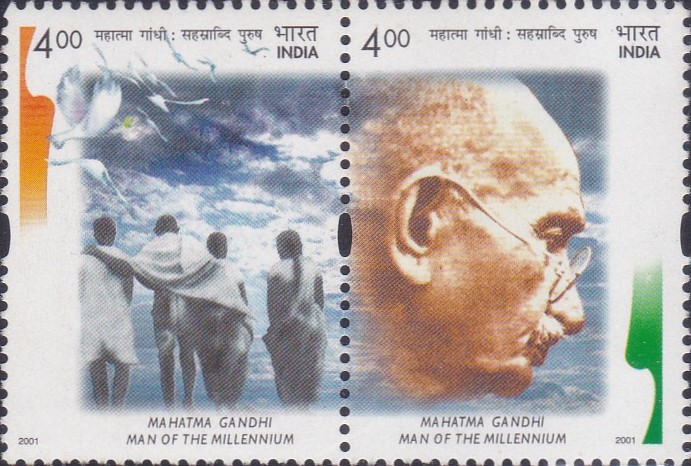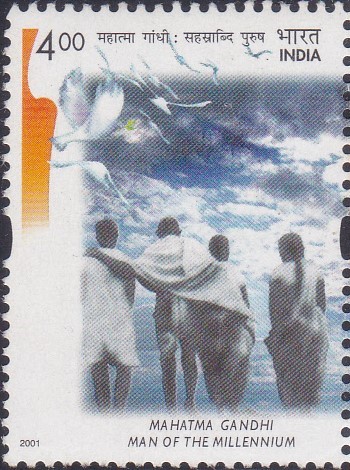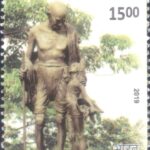
Mahatma Gandhi : Man of the Millennium
Complete Set of 2 nos of se-tenant postage stamps on the first Gandhi Jayanti of the new millennium :


 Issued by India
Issued by India
Issued on Oct 2, 2001
Issued for : The Department of Posts issued a postage stamp in setenant format in homage to the Mahatma on the occasion of the first Gandhi Jayanti of the new millennium (02.10.2001). The stamp seeks to underline the message and relevance of Mahatma Gandhi which transcend the boundaries of time and space and are as relevant in the new millennium as in the earlier.
Credits :
Stamp : Kamleshwar Singh
FDC : Pulak Biswas
Cancellation : Alka Sharma
Type : Se–tenant pair of 2 Stamps, Mint Condition
Colour : Four Colour
Denomination : 400 Paise
Overall Size : 5.8 x 3.91 cms.
Printing Size : 5.45 x 3.6 cms.
Perforation : 13.5 x 13.5 mm with elliptical hole on each 3.91 cm sides
Paper : Matt Chromo
Stamps Printed : 3.0 million
Number per issue sheet : 20
Printing Process : Photo Offset
Printer : Calcutta Security Printers Ltd.
Name : Mohandas Karamchand Gandhi
Born on Oct 2, 1869 at Porbandar, Gujarat, India
Died on Jan 30, 1948 at New Delhi, India
About :
- “Gandhi was inevitable. If humanity is to progress, Gandhi is inescapable. He lived, thought and acted, inspired by the vision of humanity evolving towards a world of peace and harmony.” – Dr. Martin Luther King Jr.
- The human race is unable to shed the spectre of strife and violence even as it takes its first steps into the third millennium. Though the threat of wars between competing nationalities has somewhat receded, the new sources of conflict like terrorism, sectarianism and fundamentalism are proving to be equally destructive, if not more. As violence is being propagated to counter violence, Mahatma Gandhi’s humanism with its soothing and healing touch is sorely missed.
- Mahatma Gandhi’s major political goal – and eventual achievement – was to rid India of British rule through a campaign of non-violence. He worked up the moral sanctions through non-violent mass movements, which made the British realise the injustices of the colonial regime, and compelled them to quit India. The constructive programmes, which he devised to achieve this goal, were not mere political struggles – they also aimed to awaken India to social equality and economic self-reliance. A proud and grateful India acknowledges him as the Father of the Nation and looks up to his teachings for guidance at every hour of crisis. The free and harmonious society in which we Indians live today in his legacy to the country.
- Mahatma Gandhi’s philosophy was based on an abiding faith in the underlying goodness of the human conscience. Even while opposing the immorality of the colonial system, he so loved the oppressors as to win them over. The success of his novel forms of peaceful struggle against the most powerful colonial regime of the world established him as one of the greatest leaders of the twentieth century. Gandhian principles played a part in inspiring similar movements throughout the world, removing dictators in countries as far apart as the Philippines and Poland and providing the inspiration for the likes of Martin Luther King and Nelson Mandela.
- To Mahatma Gandhi, truth was like religion. Political freedom of the country was not the end of his mission. His ideal was a society which consisted of self-regulated individuals, each performing his duty to others. Every member of this society would uphold moral values, follow truth and cultivate fearlessness.
- Text: P.N. Ranjit Kumar








[…] the cause of women as early as in 1917. She joined the National Movement under the inspiration of Mahatma Gandhi. Her involvement in the National Movement was total and she was sentenced to imprisonment in 1932 […]